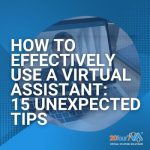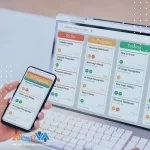15 Tasks A Virtual Legal Assistant Can Do For You
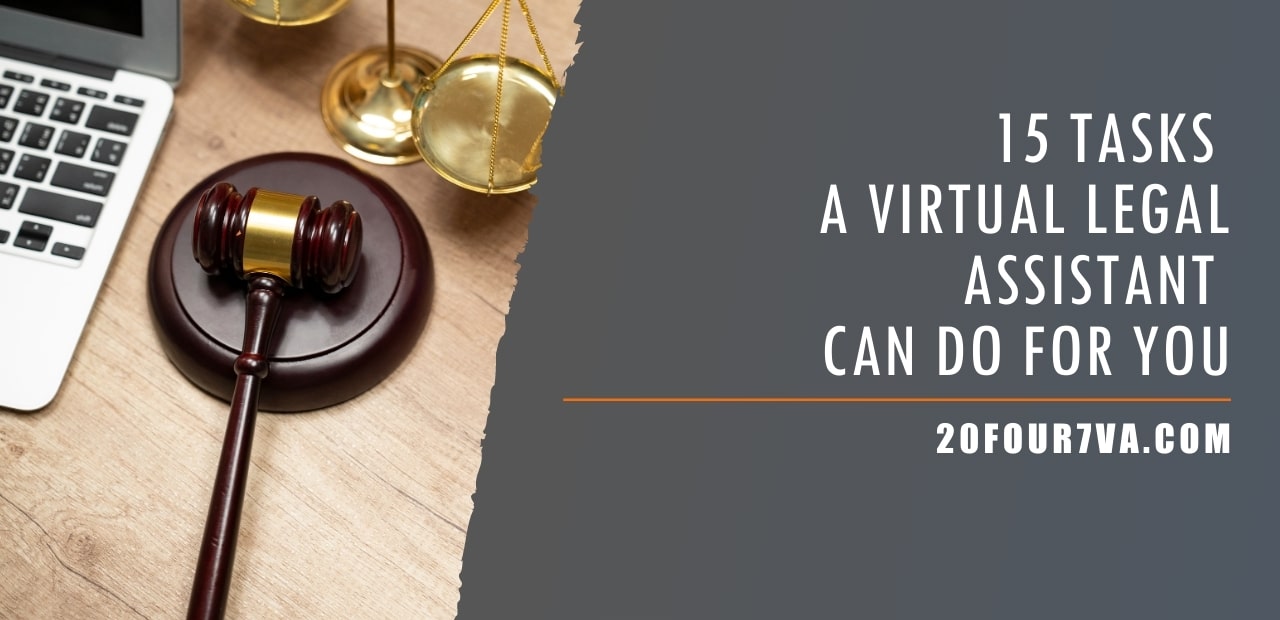
As law firms join the worldwide move to modern offices and hybrid work arrangements, more and more lawyers have started outsourcing their busy work to virtual assistants. If your office has never hired a legal virtual assistant, you may wonder what they are and can do for you.
What is a virtual legal assistant?
The demands of a legal practitioner can be overwhelming. The long hours, meetings, deadlines, and intense pressure can take a toll on a lawyer’s mental well-being. In fact, a 2017 study published by the American Bar Association reports that about 28% of lawyers suffer from depression while another 19% experience severe anxiety. Notably, the study found that a significant number of lawyers would not recommend pursuing law as a career.
As they try to stay on top of their game and win cases, lawyers also have to run their practice or oversee the various administrative tasks in a law firm. But there simply isn’t enough time in a lawyer’s day to manage everything that his office needs to do. That’s where a virtual legal assistant comes in.
A virtual legal assistant (VLA) is a professional who provides administrative or personal assistant services. The VLA works remotely from anywhere in the world, usually as an independent contractor. Virtual legal assistants don’t require office equipment or supplies and are only paid for the hours they put in.
Lawyers or law firms hire virtual legal assistants to handle the repetitive but essential tasks of a law office, including transcription, file management, legal research, email and call handling, and the like. As such, virtual legal assistants should have some basic knowledge about the legal profession.
It’s important to note that a virtual legal assistant is not a legal practitioner. The duties of a VLA do not include providing legal advice. Let’s take a look at what they can do:

Tasks to outsource to legal virtual assistants
-
Sort through emails
Take a look at your unread emails. Chances are there are lots of them. According to Adobe, a white-collar worker spends about 4 hours each day sorting through their work email. That’s 4 hours you could have used doing more important tasks. A VLA will go through your work emails and notify you of important correspondence.
-
Respond to inquiries
As a lawyer, you’re always on your feet. You have clients to meet, witnesses to interview, and proceedings to attend. Of course, there’s also your non-work life to be mindful of. You can’t waste time answering the phone or replying to messages. The virtual legal assistant will respond to client inquiries as they sort through the emails. They will also make sure you are aware of all the inquiries and how they were handled just so they won’t be left in the dark.
-
Manage your calendar
It will be your remote legal assistant’s duty to manage your calendar and keep you on track. The VLA will make sure you don’t miss meetings, appointments, and important deadlines by reminding you of your schedule. Having an organized calendar will also help the VLA keep track of your activities so they can make changes if necessary.
-
Plan and book trips
Lawyers travel a lot. Litigators, for example, may need to fly or hit the road to meet clients or witnesses. This becomes a necessity if the other person is in a hospital or incapable of traveling. There are also lawyers that need to travel to attend trials, arbitrations, or business deals.
You can’t waste time booking flights and finding hotels to stay in. Your precious time is best spent doing research and studying for the case you’re handling.
-
Organize files
The virtual legal assistant is tasked with keeping all the files organized. Lawyers cannot afford to lose or misplace even one document. In a worst-case scenario, a lost document such as a vital piece of evidence may cost the lawyer the case.
The files should be accessible from any device so you can take a look whenever and wherever you are. The VLA should also show you the ins and outs of the filing system in case your assistant is unavailable.
-
Draft contracts
A contract is a set of promises that is legally binding. It ensures that the parties involved will stay true to what has been agreed upon. A contract can be a verbal agreement but this can easily be disputed. To make sure that the promise is upheld, you have to put it into writing.
The virtual legal assistant will help draft contracts using the details you will provide. They should make sure that the contract can be clearly understood so both parties will be comfortable signing it.
-
Create presentations
Lawyers often rely on presentations to communicate their capability to prospective clients. Your chances of you representing them may depend on how clear and impressive your presentation is. The virtual legal assistant may assist you by creating PowerPoint presentations that convey your message with less text and more graphs, figures, and other visuals.
Slide presentations may also come in handy while preparing and during a trial. In fact, when done right, these presentations will help the jury understand your points more clearly. You must work closely with your VLA when making these vital presentations.
-
Assist in pre-trial preparations
The virtual legal assistant will provide the lawyer assistance in preparing for trials. They will be tasked with writing reports, drafting contracts, and other legal documents necessary in a case. The VLA may also be asked to procure documents that will be used as evidence such as affidavits and formal statements.
-
Conduct research
There is a bit of investigation involved in law practice. By that, we don’t mean going undercover and doing stakeouts. Pretending to be somebody else to obtain information is also illegal as Hewlett-Packard learned the hard way in its 2007 pretexting case.
Much of the investigation will be done through thorough legal research. Proper research is vital to a case and while lawyers gain that skill from law school and during practice, they can’t find everything they need all at once. The virtual legal assistant can aid the lawyer by doing some of the necessary research.
-
Transcribe recordings
Unless your name is Boris Konrad or Alex Mullen, you probably can’t memorize everything that is said during proceedings, depositions, and client interviews. This is why lawyers often have a recorder with them. They also sometimes hire someone to record everything.
A virtual legal assistant may also be tasked with transcribing recordings. Obviously, the VLA has to listen carefully to the recording so a keen sense of hearing is a plus. Lots of patience is necessary as it normally takes four hours to transcribe an hour of recording with just one speaker. A one-hour recording with two speakers will take six hours to fully transcribe. Familiarity with legal terminologies and even the case being discussed is a huge advantage.
-
Handle bookkeeping and accounting
Accounting and bookkeeping require complete attention to be done right. A simple mistake will be problematic. However, lawyers are almost always too busy to focus on the financial side of the business. What they can do is hire a virtual legal assistant to take care of them.
-
Invoicing and billing
The virtual legal assistant may also count billing and invoicing as one of their duties. There are various accounting tools that your firm can utilize to better organize your finances. The VLA can prepare the attorney invoice and send the billing documents to the clients after you have reviewed them. At the same time, your virtual assistant can prepare their invoices along with other staff members if you have any.
-
Website management
Lawyers need to market themselves and their firms so people are aware of the services they are offering. The more effective their marketing tactics are, the more business opportunities are generated.
A website is one tool that can help lawyers and small firms get noticed. The remote assistant will be responsible for maintaining the website. Part of the task includes producing SEO-driven content that will help the website rank high in searches. If your website is highly visible in Google and other search engines, it may translate to more clients.
The virtual legal assistant also needs to update the website regularly. Aside from regularly posting fresh content, the VLA should also make sure the website is mobile compatible. Lots of people use their smartphones for browsing. You want your potential clients to see everything clearly upon visiting your website.
You need to establish your brand. Your VLA will help with your online bio and LinkedIn profile that will establish you as a dependable and trustworthy lawyer. In other words, people should see you as the right person to represent them.
-
Social media management
Your virtual legal assistant will be in charge of your digital marketing campaign so they will also handle your social media accounts such as Facebook, Twitter, and Instagram. The main purpose of these social media accounts is to enhance your market. The VLA will regularly post relevant content on these platforms that should be easy to read on both computers and phones. They will also increase social media engagement by interacting with users.
-
Video creation
YouTube is another popular social media platform that you can use to market your law firm. Take videos of yourself talking about different cases and legal tips. The virtual legal assistant will then edit the videos and make them more palatable to your audience. The VLA can also research topics that you can discuss and write the script for the video.
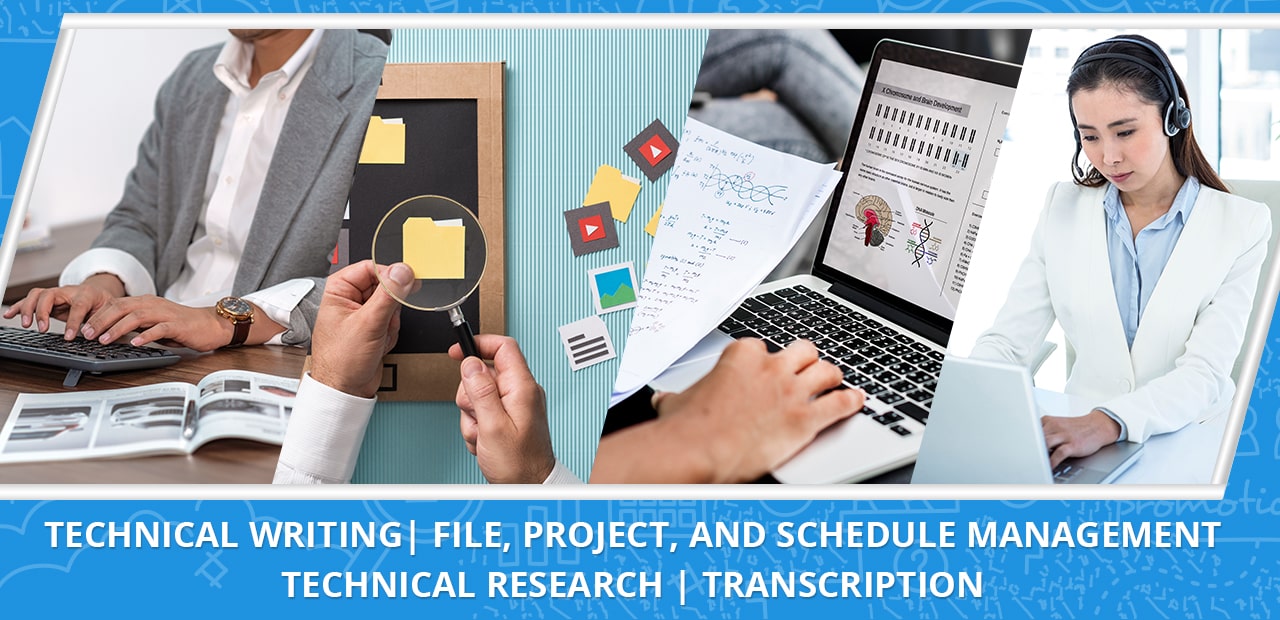
What to look for in a virtual legal assistant
Hard skills:
-
Technical writing
An online legal assistant can be tasked to draft contracts and other important documents. Obviously, a legal assistant needs to know how to compose error-free write-ups. One simple typographical error can be detrimental to a case. Mistakes in spelling, grammar, or sentence construction can cause misunderstanding. Aside from having proper writing skills, the VLA should also be thorough in reviewing all documents they write.
-
File, project, and schedule management
A productive workplace is one that is organized. There can only be progress in the office when everyone knows what they’re supposed to be doing and everything is where they’re supposed to be.
The ability to be organized is one of the most important skills to look for in a virtual employee. The VLA candidate should know how to build a file system that is easily accessible even by old school lawyers who can’t keep with technology. The VLA should also be an expert in organizing the work calendar so you don’t miss out on deadlines, meetings, events, and projects.
-
Technical research
A virtual assistant should be computer and internet savvy. They work on their computer all day so these skills are definite must-haves. A VLA candidate should know more than the basics of computer use. Some programs they should be familiar with include Microsoft office particularly Word, Excel and PowerPoint. Familiarity with apps that can be used to improve productivity in your office is also a plus.
Research skills are necessary for the success of a case. The VLA should be able to locate expert witnesses who can give testimonies based on their specializations. A background check on your potential witness may also be necessary.
The VLA will also have to do some research related to the cases you are handling. This will include looking for legal documents and unearthing some facts about the case and those involved.
Research skills will also be necessary for marketing your services. The VLA should know how to look for trends and other marketing gems that can help get you more clients.
-
Transcription
As mentioned, the virtual legal assistant will likely be asked to transcribe recordings. It’s not enough to just play and listen to the recording. A VLA needs the right typing skills, which includes typing fast but accurate. They will also need to edit their work for errors so editing skills are a must-have, too. Plus, the VLA should have a little background on lawyer lingo and legal processes.|
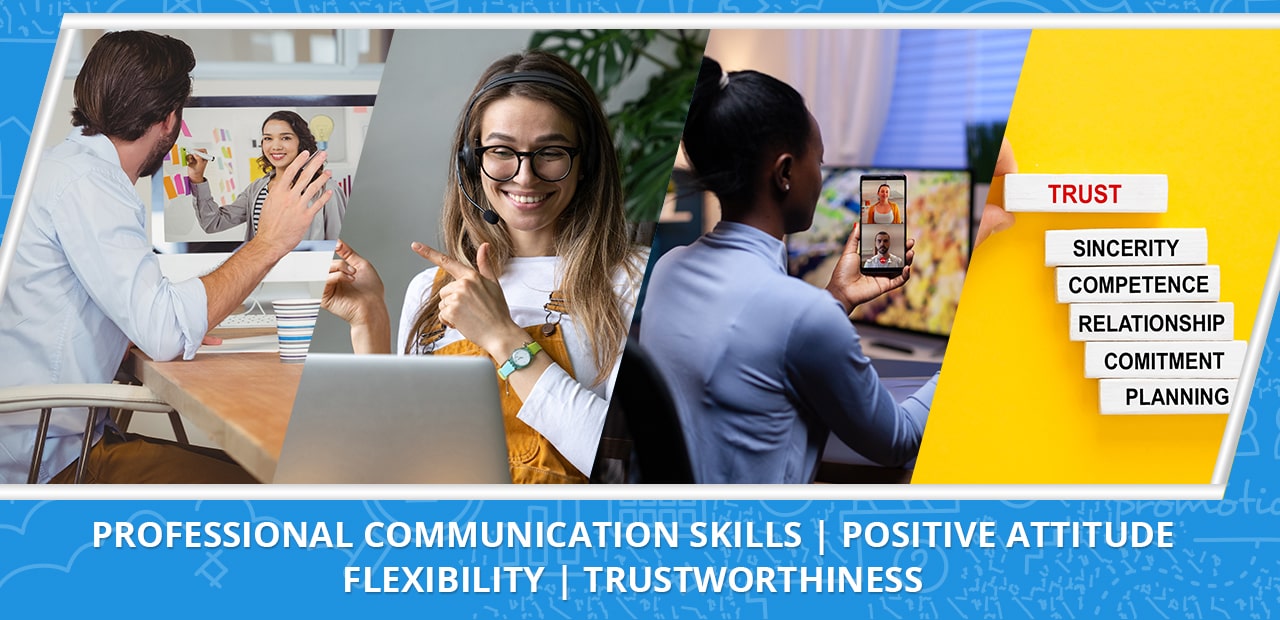
Soft skills:
-
Professional communication skills
Communication is vital in a remote work setting. The virtual legal assistant should be able to convey their messages and concerns to their employer clearly so that all tasks will be done without a hitch. At the same time, the VLA should know how to communicate properly with potential clients as they will be tasked with handling inquiries and follow-ups.
-
Positive attitude
Look for a VLA with a pleasing personality and a great attitude, particularly towards work. As a remote worker, a VLA should know how to prioritize and take their work seriously. They should also be motivated to perform well.
-
Flexibility
Many remote workers have multiple jobs so they set a certain time to focus on each one. One advantage of this is that they will try to accomplish as much as they can during your work hours. However, you may want your VLA to be flexible. There will be times when you need to have something done immediately so it will be advantageous for you if your VLA is available when you need them.
-
Trustworthiness
As a lawyer, you’re dealing with sensitive information. If any piece of vital information is leaked out, you may lose a case. You will also lose potential clients if people found out that your office cannot be trusted.
You need to look for a virtual legal assistant that values confidentiality. In fact, it should be one of the core principles of every remote employee and freelancer. Since there is no physical interaction between an employer and a virtual legal assistant, the latter should do what they can to prove that they can be trusted. If they break that trust, potential employers will think twice before obtaining their virtual legal assistant services.

Common concerns about hiring a virtual legal assistant
-
“I don’t know what a virtual legal assistant is.”
One of the most common reasons why lawyers are wary of hiring a virtual legal assistant is that they don’t know what a virtual legal assistant actually is. Many lawyers who have been at it for years or even decades are quite hesitant to adapt to current trends, including those related to the practice. Since many old-timers are not that keen on technology, they may not be aware of virtual assistants. Some may even dismiss the fact that remote workers are necessary in this day and age.
Solo practitioners and lawyers of small local law firms may also not see the need to hire virtual legal assistant services. However, you’ve spent years studying law not accounting, information technology, or secretarial jobs. A virtual legal assistant will take such tasks not directly related to your practice off your hands.
-
“What if my virtual legal assistant suddenly quits?”
In any kind of business, it’s always difficult if even one employee suddenly calls in sick. Most of the time, this can be remedied. The employer will have to make the necessary adjustments to compensate for the worker’s absence.
The problem multiplies tenfold if an employee suddenly quits or disappears completely without any notice. This is a legitimate concern for lawyers regarding virtual legal assistants.
It is the responsibility of virtual legal assistant companies to have VLAs in their stable that are ready to provide service anytime it is needed. But truth be told, it may be difficult for the lawyer to adjust to a new remote assistant, especially if they are currently handling a case.
One possible remedy to this potential problem is to hire a virtual legal assistant from a reputable company. Lawyers should also consider hiring someone with extensive experience who values the code of ethics. They may come at a price but they’re definitely worth it.
-
“How do I know what my virtual assistant is working on?”
Another common concern of lawyers is that their virtual legal assistant doesn’t accomplish their tasks on time or not at all.
One way to avoid this is to constantly communicate with each other. It can be as simple as sending messages or having calls to check on the status of certain tasks. However, most attorneys are too preoccupied to regularly check on their virtual legal assistant. The VLA should take it upon themselves to constantly send updates to their employer.
When assigning tasks, the lawyer should indicate the order of priority. The remote assistant can then work on the time-sensitive projects first before proceeding with other tasks. Again, effective communication is vital. If you have a task that suddenly needs to be prioritized, you should communicate this clearly to your virtual assistant.
Another solution is to use a time tracker or task management system. Such software allows the employer to see the status of a task designated to the virtual legal assistant. On instances that you cannot reach your virtual legal assistant, you can still check on a task by logging into the task management software.
-
“How do I trust someone I’m working with remotely?”
Since a lawyer’s job is complicated, it’s understandable why some are quite apprehensive when dealing with a virtual legal assistant. For one, they cannot physically see and interact with the person. Some lawyers may find it difficult to delegate and explain tasks to a computer screen.
Furthermore, some law practitioners may have a difficult time trusting someone they cannot physically interact with. It’s true that one can get a better feel about a person after seeing them face-to-face. This is impossible with remote assistants.
Before hiring a VLA, you will have to interview the person. Make the most of this opportunity to know the applicant. Once the applicant is hired, keep the communication lines open so you can integrate the VLA easier.

Tips for hiring a legal assistant
It’s unlikely to have face-to-face interviews with your VLA candidates. That’s unfortunate since you can better gauge a person’s personality and capability when he or she is sitting in front of you. As such, you can still learn about the candidate through a virtual hiring process. If you have worked with virtual assistants before, you may have an idea of how to hire a VLA. In case you are new to the concept, here are some tips on how you can find the right virtual legal assistant for you.
-
Make a list of qualities and skills
Determine the qualities and skills that you need in a VLA and indicate them in your job post. This should help ensure those who will apply for the job are qualified. As the applications pile up, use this list to narrow down your choices.
-
Hire a VA that’s good at something you’re not
You may have topped the bar exams but you’re not that well-versed in bookkeeping and accounting. Hiring a VLA that is not that good with numbers means you either have to do the accounting yourself or hire an actual accountant. That’s not a good idea if you’re just starting out.
In the same breath, your virtual legal assistant should be capable of doing tasks that you’d rather not do. Even if accounting can be your second career, you don’t really need to crunch numbers. Let your VLA handle this and focus more on the cases you’re handling.
-
Find someone with the same work ethic and style
It’s important to work with someone with the same principles and working style as you. Once you hire your virtual assistant, you want the transition or integration to be as smooth as possible. The quicker your VLA adjusts to how you do things, the better the workflow will be.
-
Set clear expectations
You have to make it clear during the hiring process what your expectations are. The virtual legal assistant candidate should know what they are supposed to do under your employ. At the same time, they should be aware of what they can expect from you or your firm. This should help both parties decide if you are right for each other.
Whether you’re a newbie lawyer or a veteran of many years, you need all the help you can get. Hiring a virtual legal assistant (VLA) is one way to lessen the work and alleviate the stress. You can designate a number of tasks to your VLA so you can focus on the more important aspects of the job and life.
As a lawyer, you need to keep learning and improving your craft. You may find that difficult if the stress of running the administrative side of your practice is holding you back. Outsourcing can be the answer to all your problems. Hire a virtual legal assistant and take a load off your shoulders.









